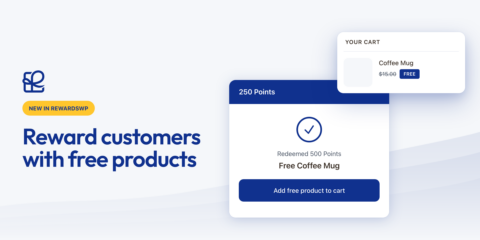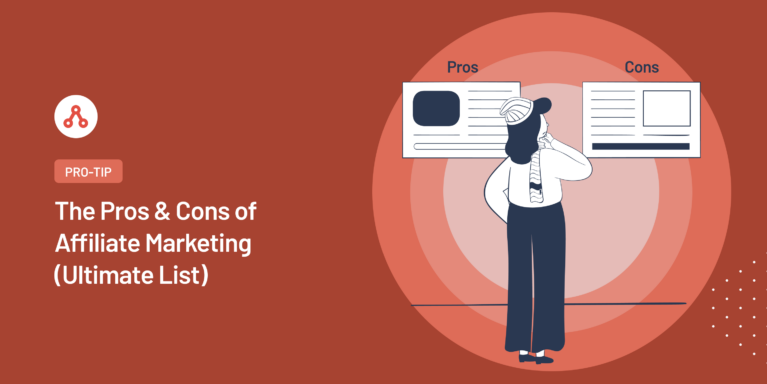
Reward Your Customers with Free Products, Not Just Coupons
Not every reward needs to be a discount. Now you can offer any product from your store as a loyalty or referral reward - customers claim it, add to cart, and it's free.
Continue Reading →
Not every reward needs to be a discount. Now you can offer any product from your store as a loyalty or referral reward - customers claim it, add to cart, and it's free.
Continue Reading →
Having worked closely with thousands of businesses running affiliate programs through AffiliateWP, I’ve gained unique insights into why affiliate marketing works.
But I’ll be honest, affiliate marketing isn’t a magic bullet that automatically brings success.
Like any business strategy, it comes with its set of advantages and challenges that every business owner needs to understand before diving in.
In this guide, I’ll break down the real pros and cons of affiliate marketing based on our experience helping businesses build and manage successful affiliate programs.
First, let’s understand what affiliate marketing is.

Affiliate marketing is a performance-based strategy where you pay partners (affiliates) a commission for driving sales or leads to your business. These partners promote your products through their websites, social media, or email lists, and you only pay them when they deliver results.
But why businesses like affiliate marketing? Well, big brands like Shopify, Kit, Fiverr, eBay, HubSpot choose this model primarily because it minimizes risk. You’re not spending money on ads hoping they’ll convert, you’re only paying when you make money.
The data behind affiliate marketing’s growth has honestly blown me away.
The global affiliate marketing industry, valued at $15.7 billion in 2023, is projected to reach $36.9 billion by 2030. In fact, businesses see an average return of $6.50 for every dollar spent on affiliate marketing, making it one of the most cost-effective marketing channels available.
Looking at both sides of the equation, successful affiliates are earning between $10,000 to $400,000 yearly, while businesses only pay for actual results.

With conversion rates between 1-5%, affiliate marketing now drives 16% of all online orders in the U.S.
But before you rush to launch your program, there’s more you need to know.
Let me break down the real pros and cons I’ve seen businesses encounter with affiliate marketing.
After years of working with businesses implementing affiliate programs, here are the most impactful advantages I’ve consistently seen deliver results:
When running paid ads, you’re spending money hoping for conversions. With affiliate marketing, you’re only paying when a sale actually happens.
If an affiliate sends 1,000 visitors but none convert, you don’t pay a penny. This dramatically reduces your marketing risk and ensures your marketing budget directly correlates with revenue.
I’ve seen businesses completely transform their cash flow by switching from upfront ad spend to this performance-based model.
Your affiliates have already done the hard work of building trust with their audiences. When an affiliate recommends your product, you’re not starting from zero – you’re leveraging years of relationship building.
Ask any business running a successful affiliate marketing program, they’d say that with just few quality affiliates they might have got more qualified leads than their years of social media advertising.
This is simply because quality affiliates have deeply engaged audiences who trust their recommendations.
Your affiliates create unique content about your products across multiple platforms and websites.
This means dozens of new pages talking about your brand, creating valuable backlinks, and ranking for different search terms.
And I like it because this content creation and distribution happens naturally as affiliates work to promote your products, expanding your digital footprint without direct investment in content creation.
Affiliates often specialize in niche markets that might be completely off your radar.
This natural market expansion happens because affiliates already understand these specific audiences and know exactly how to position your product to meet their needs.
You get to test new market segments without the traditional risks and costs of entering new markets.
A well-structured affiliate program becomes a self-sustaining sales machine.
Once your program is running, affiliates continuously promote your products, test new approaches, and optimize their strategies.
The system generates sales across different time zones and markets, even when you’re not actively managing it – creating a truly scalable sales channel that complements your existing marketing efforts.
Your affiliates experiment with different marketing channels and strategies you might never try internally.
Some focus on detailed YouTube tutorials, others excel at email marketing, while some master SEO content. Each affiliate’s unique approach creates multiple marketing experiments running simultaneously – all without you investing in testing these channels yourself.
The insights from their success (or failure) basically give you free market research about what messaging and platforms work best for your product.
Unlike other marketing channels that require substantial upfront investment, affiliate marketing aligns perfectly with your cash flow.
Just think about it for a second, by the time you pay your affiliates, you’ve already received payment from the customer.
This means you’re never out of pocket, and your marketing costs are always covered by actual revenue. This is particularly valuable for businesses with tight operating budgets or those looking to scale without external funding.
Here’s something most people miss about affiliate marketing: it’s not just about the initial sale.
When affiliates bring in customers who are highly aligned with your product (because they trust the affiliate’s recommendation), these customers often have higher lifetime values.
The reason is, they came through a trusted source who properly set expectations about your product.
Plus, many affiliates continue nurturing their audience post-purchase, essentially becoming an extension of your customer success team, leading to better retention rates and more repeat purchases.
After sharing the upsides, let me be completely transparent about the real challenges you’ll face with affiliate marketing:
Your brand’s reputation now partially rests in the hands of affiliates. While you can set guidelines, you can’t control every piece of content or promotional method they use.
Some affiliates might use aggressive or misleading tactics to drive sales, potentially damaging your brand’s credibility.
And by the time you spot problematic promotion methods, the damage to your reputation might already be done.
As more competitors enter your market, there’s constant pressure to maintain competitive commission rates.
I’ve seen businesses forced to raise their commissions just to keep their top affiliates from switching to competitors, directly impacting profit margins.
The reality is, once you set a commission rate, lowering it becomes extremely difficult without losing your best performers.
The “hidden” cost of affiliate marketing lies in maintaining reliable tracking systems which depends mostly on what affiliate management tool you’re using.
Tracking can break due to website updates, cookie issues, or technical glitches, leading to missed commissions and frustrated affiliates. Add in different devices, browsers, and ad-blockers, and you’re constantly fighting to ensure proper attribution.
One missed commission can destroy affiliate trust that took months to build.
Some affiliates will try everything from cookie stuffing to self-referrals to inflate their commissions.
Others might bid on your brand terms in paid search, essentially charging you for customers who would have come directly.
The sophisticated nature of some fraud methods means you’ll need dedicated time and tools to monitor and prevent abuse.
When multiple marketing channels are running simultaneously, attribution becomes a nightmare.
If a customer clicks an affiliate link but also interacts with your Facebook ads before purchasing, who gets credit?
These conflicts can lead to double-paying for conversions or demotivating affiliates who feel they’re not getting proper credit for their efforts.
Running a successful affiliate program requires significant ongoing effort, unless you’re using an affiliate management tool like AffiliateWP that allows you to automate certain tasks.
You’ll need to constantly recruit new affiliates (because many will become inactive), create promotional materials, answer questions, review applications, monitor performance, and handle payouts.
Many businesses underestimate this administrative overhead until they’re neck-deep in managing hundreds of affiliate relationships.
Affiliates often compete on price, leading to a race to the bottom. They’ll promote whoever offers the highest commission or has the lowest prices to maximize their earnings.
This creates pressure to either lower your prices or increase commissions, squeezing your margins from both ends.
Plus, customers acquired through discount-focused affiliates often have lower lifetime values and are more likely to churn when they find better deals elsewhere.
A most obvious question that you might be thinking right now would be “is affiliate marketing right for my business?”
Let’s be realistic. The cons we discussed aren’t small challenges, and every business needs to carefully evaluate if they can handle these aspects of affiliate marketing.
But here’s my straightforward take on the current marketing landscape: with rising ad costs (some industries seeing CPAs jump 30-40% yearly) and declining organic reach, affiliate marketing offers a sustainable alternative for business growth.
The key is understanding what you can and can’t manage.
While concerns about program management, fraud prevention, and affiliate relationships are valid, current affiliate management solutions have largely automated these pain points. Tools like AffiliateWP handle the heavy lifting, from automatic affiliate screening and fraud detection to instant commission payouts and performance tracking.
The real question isn’t whether affiliate marketing works (the data clearly shows it does), but rather if your business is ready to:
If you can commit to these core aspects, the technical and administrative challenges shouldn’t hold you back.
The performance-based nature of affiliate marketing, combined with automated management tools, makes it one of the most scalable and cost-effective marketing channels available today.
Ready to launch your affiliate program? Get started with AffiliateWP, the most trusted WordPress affiliate plugin. Includes all essential features and comes with a 14-day money-back guarantee.
Loved our guide? Follow us on Facebook and Twitter for more free affiliate marketing tutorials and guides.
Disclosure: Our content is reader-supported. This means if you click on some of our links, then we may earn a commission. We only recommend products that we believe will add value to our readers.
Launch your affiliate program today and unlock a new revenue channel to grow your business faster.
We use cookies to improve your experience on our site. By using our site, you consent to cookies.
Manage your cookie preferences below:
Essential cookies enable basic functions and are necessary for the proper function of the website.
Statistics cookies collect information anonymously. This information helps us understand how visitors use our website.
Marketing cookies are used to follow visitors to websites. The intention is to show ads that are relevant and engaging to the individual user.